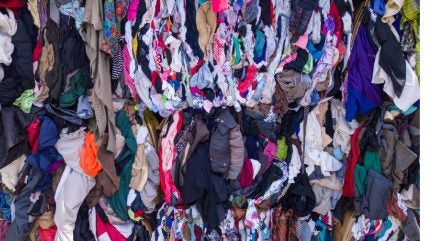
The project was launched by Dutch textile recycling centre Boer Group with financial backing from Refashion. Both Boer Group and Refashion, which are active partners of the ReHubs alliance, have established a complete European value chain.
As part of the project, textiles were collected and sorted in France before being prepared in the Netherlands by Frankenhuis, which handled colour sorting and defibration. Frankenhuis is a mechanical recycling specialist and part of the Boer Group.

Discover B2B Marketing That Performs
Combine business intelligence and editorial excellence to reach engaged professionals across 36 leading media platforms.
Blue and white textiles were selected to naturally influence the colour of the final yarn. The feedstock was then transferred to Italy, where Spinaker spun the yarn and Stella Sky knitted the fabric.
As the end customer, Zeeman played a key role in defining the product and ensuring it met consumer expectations.
According to a statement from ReHubs, each garment produced for Zeeman through this project contains 70% recycled content.
Zeeman senior buyer circular Mariëlle van Dillen said: “At Zeeman, we want to show that circular innovations can also be accessible for affordable clothing for everyone. By collaborating with strong European partners, we have proven that post-consumer textile waste can be turned into new, high-quality products that our customers love to buy.

US Tariffs are shifting - will you react or anticipate?
Don’t let policy changes catch you off guard. Stay proactive with real-time data and expert analysis.
By GlobalData“The sweaters from this project were a great success in our stores, selling very well and demonstrating that customers value affordable circular fashion. This project brings us one step closer to our ambition to reuse textiles more often and reduce our impact as a retailer.”
The project, which ran over eight months, was designed to test both the technical and financial feasibility of producing garments with high levels of recycled content in Europe.
It demonstrated that post-consumer textiles could be converted into quality yarns and garments, achieving a circular value chain from collection to manufacturing within the region.
Yarn developed during the initiative reduced the product’s environmental footprint compared to conventional yarn, resulting in lower greenhouse gas (GHG) emissions, reduced water consumption, and decreased energy use, an environmental impact report accompanying the project revealed.
Refashion circularity head Véronique Allaire said: “This project proves that Europe can turn its textile waste into new garments at scale. By building a fully circular value chain here in Europe, we have shown that textile-to-textile recycling is not only possible but commercially viable. It’s a powerful signal that our industry can lead the shift towards a truly circular economy.”





